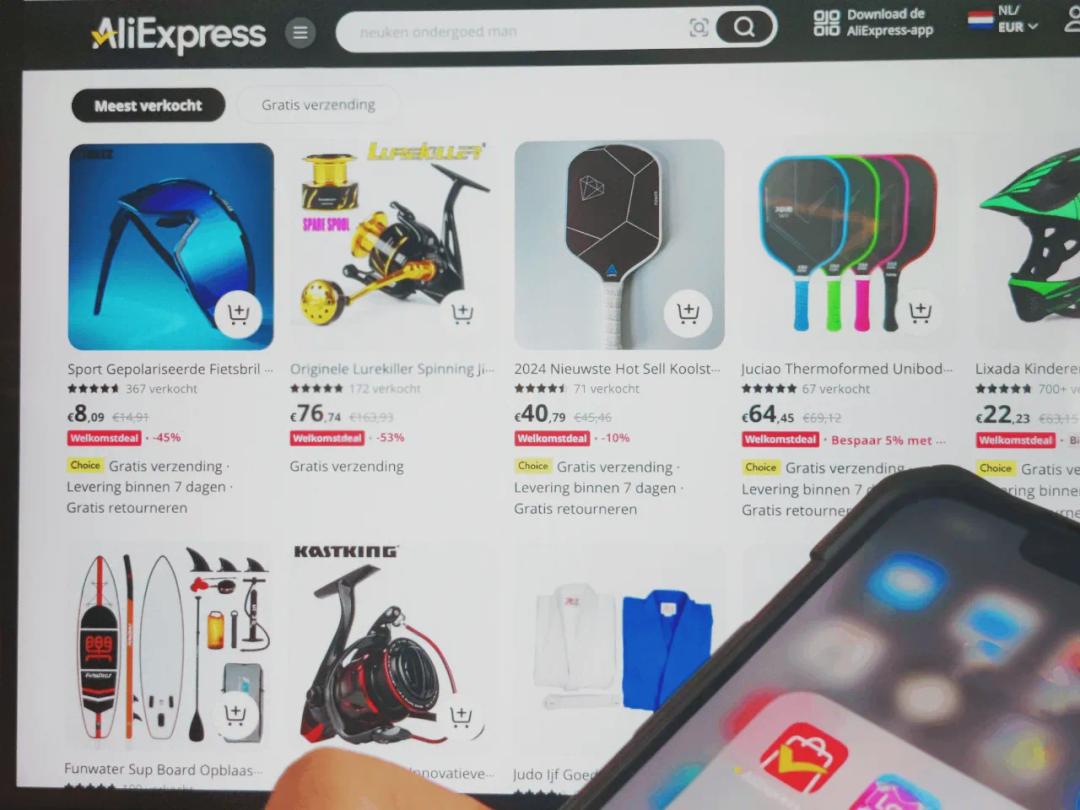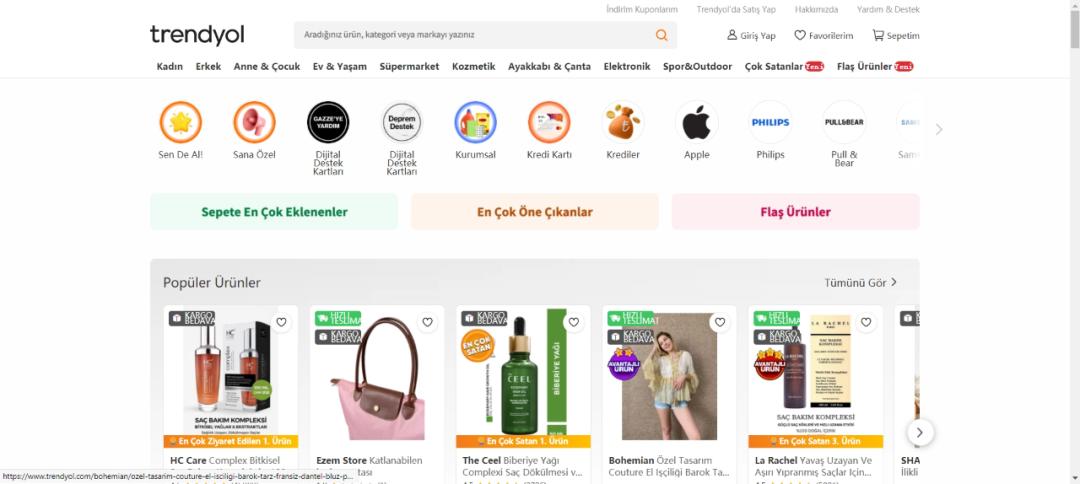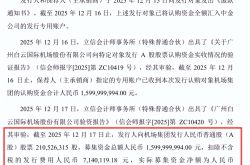Behind the rapid growth, Alibaba's international e-commerce has delivered a comprehensive strategy
![]() 08/18 2024
08/18 2024
![]() 496
496

Written by Ji De Edited by Ziye
Alibaba's Q1 FY2025 financial report released on August 15th revealed that the International Digital Commerce Group maintained robust growth, with revenue increasing by 32% YoY to RMB 29.293 billion, exceeding market expectations for the eighth consecutive quarter. Notably, the International Retail Commerce segment achieved a high growth rate of 38%.
This strong performance was driven by cross-border business growth, particularly in AliExpress's Choice business. As mentioned in the previous financial report, Choice orders already accounted for 70% of AliExpress's total orders. During the post-earnings call, it was further emphasized that the proportion of Choice orders remained high and stabilized, enhancing user experience consistency and reliability.
In addition to improving user experience, AliExpress has continued to expand overseas and opened up more sales channels in recent times.
In June this year, AliExpress collaborated with Brazilian retail giant Magalu, enabling the interconnection of sales channels and products, attracting significant attention in Brazil. According to Conversion, an research institution, AliExpress ranked first among all cross-border e-commerce platforms in terms of monthly visits in Brazil during that month.
Alibaba International has also been delivering positive news in other key markets.
In Southeast Asia, Lazada recorded a positive EBITDA in July, achieving profitability, as reported by The Wall Street Journal. Lazada CEO Dong Zheng expressed the intention to continue increasing investments. In Europe, due to the booming 'Olympic economy,' AliExpress's shipment volume increased by over 200% compared to May.

Image source: AliExpress official account
The cross-border e-commerce market continues to heat up, with platforms exploring diversified operational models, ranging from fully managed to semi-managed and overseas managed, to gain access to more markets.
Against this backdrop, Alibaba International's sustained high growth is remarkable. 'Diversification' is likely a key advantage. During the earnings call, Alibaba mentioned that its international commerce comprises a multi-mode, multi-brand business matrix, encompassing both cross-border supply and local operations, as well as B2C and B2B models.
This provides more possibilities for market expansion and enhances the potential for continued high growth in the future.
1. Behind Eight Consecutive Quarters of Strong Growth
Alibaba International's business primarily comprises international retail and international wholesale. International retail includes global e-commerce platforms like AliExpress, as well as local e-commerce platforms like Lazada, Trendyol, and Daraz in various markets. International wholesale is dominated by Alibaba.com, the company's first business venture.
Since the third quarter of FY2023, Alibaba International's e-commerce business has recorded double-digit growth for eight consecutive quarters. This sustained strong growth is attributed to Alibaba's proactive innovation and favorable market conditions.
Alibaba was an early explorer of cross-border e-commerce, reaping the first wave of benefits during its infancy. However, with the emergence of a new wave of cross-border e-commerce, led by the 'Four Little Dragons of Going Global,' cost-effectiveness, delivery speed, and product variety have become core development strategies for platforms.
The cross-border e-commerce landscape has undergone significant changes, with new operational models emerging and AI technologies rapidly integrating into various cross-border e-commerce scenarios. Optimizing logistics chains and attracting diverse merchants to achieve fine-grained operations and enhance competitive advantages have become the core upgrade paths for platforms.
Looking back over the past two years, Alibaba International once again capitalized on the first wave of benefits as this round of cross-border e-commerce innovations emerged.
In January 2024, AliExpress pioneered the semi-managed model, igniting a new wave of cross-border e-commerce enthusiasm, with other platforms swiftly following suit. Betting on the semi-managed model has gradually become a trend, providing Alibaba International with a first-mover advantage.
Recently, AliExpress intensified its efforts in 'overseas managed services,' primarily targeting merchants with overseas inventory and qualifications. The platform takes care of sales, marketing, and after-sales, while merchants only need to handle shipments and can enjoy 'billions of subsidies.' Currently, AliExpress has partnered with three major overseas warehouses to offer overseas managed entry services.

Image source: AliExpress official account
As AI's importance in global e-commerce became evident, Alibaba International quickly assembled an AI business team. By this quarter, Alibaba International's AI services supported 500,000 merchants, optimized over 100 million products, and enhanced performance in over 40 e-commerce scenarios. Meanwhile, 30,000 global SMEs have subscribed to AI foreign trade tools on Alibaba.com, Alibaba International's B2B platform.
By grasping market trends, insights into merchant and consumer needs, and leveraging AI tools to enhance critical process efficiency, Alibaba International has captured a significant market share through precise and effective strategies, creating barriers difficult to replicate.
From a macro perspective, as China's industrial chain gradually upgrades and improves, high-quality and affordable domestic brands or white-label products are increasingly favored by overseas consumers.
Concurrently, favorable policies and monetary easing resulting in high overseas inflation have further amplified the advantages of Chinese cross-border e-commerce players in terms of cost-effectiveness and efficiency.
With a high ceiling for growth, Alibaba International, as a pioneering player occupying a crucial position, is better positioned to build core advantages for long-term growth.
2. AliExpress's Positive Cycle in Implementing New Models
Over the past two years, AliExpress has rapidly transitioned from a pure platform model to a platform + managed services model, offering buyers more competitive prices and efficient fulfillment services. This managed services model delivers a superior experience, showcased prominently in the Choice section for overseas consumers.
This has been crucial for AliExpress's breakthrough. Under the managed services model, the platform handles complex logistics and fulfillment, lowering barriers for merchants expanding overseas and ensuring a more consistent consumer experience, thereby enhancing competitiveness abroad. During the earnings call, it was mentioned that AliExpress is transforming from a 'previously less efficient and weaker service-oriented business model.'
Sellers have gradually discovered that the improved logistics efficiency under AliExpress's managed services model has opened up more business opportunities. For instance, Gu Rongjun, a seller from Xuzhou, faced challenges with limited furniture logistics routes and high product damage rates early on.
After joining the managed services model in 2023, his store experienced a surge in traffic. With AliExpress's five-day global delivery service covering South Korea, Gu Rongjun's bulky furniture could reach Korean consumers within five days, leading to a surge in orders.

Shandong Preferred Warehouse, Image source: AliExpress official account
Supported by the managed services model, AliExpress's Choice service accounted for over 70% of the platform's total orders within a year of its launch.
Subsequently, introducing more product categories became crucial.
Traditionally, higher-value 'bulky' goods faced significant costs when entering cross-border markets, limiting the expansion of cross-border product categories and making it challenging for Chinese cross-border e-commerce platforms to compete with local giants like Amazon in broader areas.
In February this year, AliExpress launched its 'Overseas Managed Services,' attracting merchants with overseas inventory and qualifications. Recently, it partnered with three leading overseas warehouses (Winit, Gucang, and Meiou) to offer commission-free entry, dedicated support, and direct access to subsidies, enticing merchants to join.
Apart from upgrading managed services models, AliExpress has explored more ways to boost traffic and sales.
An operations manager running a cycling glasses brand in Xiamen mentioned that after participating in AliExpress's 'Super Boom Day,' even non-bestselling products selected for testing saw tripled sales compared to usual days. During the first event, nearly 2,000 pairs of glasses were easily sold.
Over the past few months, many sellers have achieved 'explosive sales' through 'Super Boom Day's' resource and traffic aggregation.

Image source: AliExpress official account
In terms of deep market penetration, AliExpress is also exploring partnerships with local platforms, leveraging their combined strengths to fuel local expansion.
In the Latin American market, AliExpress collaborated with Magalu, one of Brazil's largest retail platforms. AliExpress Choice products will be sold simultaneously on Magalu, while Magalu will open a store on AliExpress, offering consumers a wider range of local products.
The Latin American market, known as the 'last blue ocean' due to its low e-commerce penetration and immense growth potential, with Brazil being a crucial market for expansion in the region.
AliExpress has been deeply entrenched in Latin America for a decade, facing increasing competition from other e-commerce platforms in recent years. Despite maintaining a strong lead—with AliExpress topping Conversion's report on monthly visits among Brazilian cross-border e-commerce platforms in June, surpassing Amazon—the collaboration with Magalu further fortifies AliExpress's competitive barriers by combining their strengths in sales channels and product offerings.
The combination of upgraded managed services, open traffic strategies, and local platform partnerships forms the basis for AliExpress's positive cycle from user experience enhancement to commercial growth.
3. Advantages of Multi-Platform Layout Becoming Apparent
Apart from AliExpress, multiple Alibaba International platforms are tapping into growth potential in ways most suitable for their respective markets.
Trendyol, a local e-commerce player deeply rooted in the Middle East market, has emerged as a dark horse.
In past financial reports, Alibaba has repeatedly highlighted Trendyol's robust growth. In this quarter's report, Alibaba specifically mentioned Trendyol's increased investments in specific markets like Europe and the Gulf region.
The Middle East market is characterized by low e-commerce penetration, supportive local policies, and significantly improved consumer trust in relevant platforms, providing fertile ground for the development of Chinese cross-border e-commerce platforms.
According to Mordor Intelligence, the e-commerce market in the Middle East is projected to double in size by 2028, with a CAGR of 11.5%.
Currently, Trendyol leads in Turkey and the Middle East, ranking among the most downloaded e-commerce apps in the region last quarter.

Trendyol's official website homepage
Meanwhile, Lazada has achieved profitability in the highly competitive Southeast Asian e-commerce market.
Compared to potential markets like the Middle East, Southeast Asia's e-commerce competition has entered a 'protracted war,' with players shifting from massive spending on subsidies to focusing on profitability strategies, aiming for healthy growth while achieving profitability.
According to The Wall Street Journal, Lazada achieved profitability in Thailand as early as 2022, the first country in its portfolio to do so. That year, Lazada Thailand generated approximately 38 billion Thai baht in revenue and 3.2 billion Thai baht in profit.
Since 2023, Lazada has continuously improved its commercial efficiency through refined local operations, reduced logistics costs, and AI technology adoption, narrowing order losses for multiple consecutive quarters.
During the analyst call, it was mentioned that in July 2024, Lazada achieved a positive EBITDA (Earnings Before Interest, Taxes, Depreciation, and Amortization), and it will continue optimizing profitability while enhancing market share.
The positive cycle of upgraded models in key markets and a combined layout of diversified business models constitute the core factors sustaining Alibaba International's rapid growth this quarter. (The featured image in this article is sourced from the AliExpress official account.)





